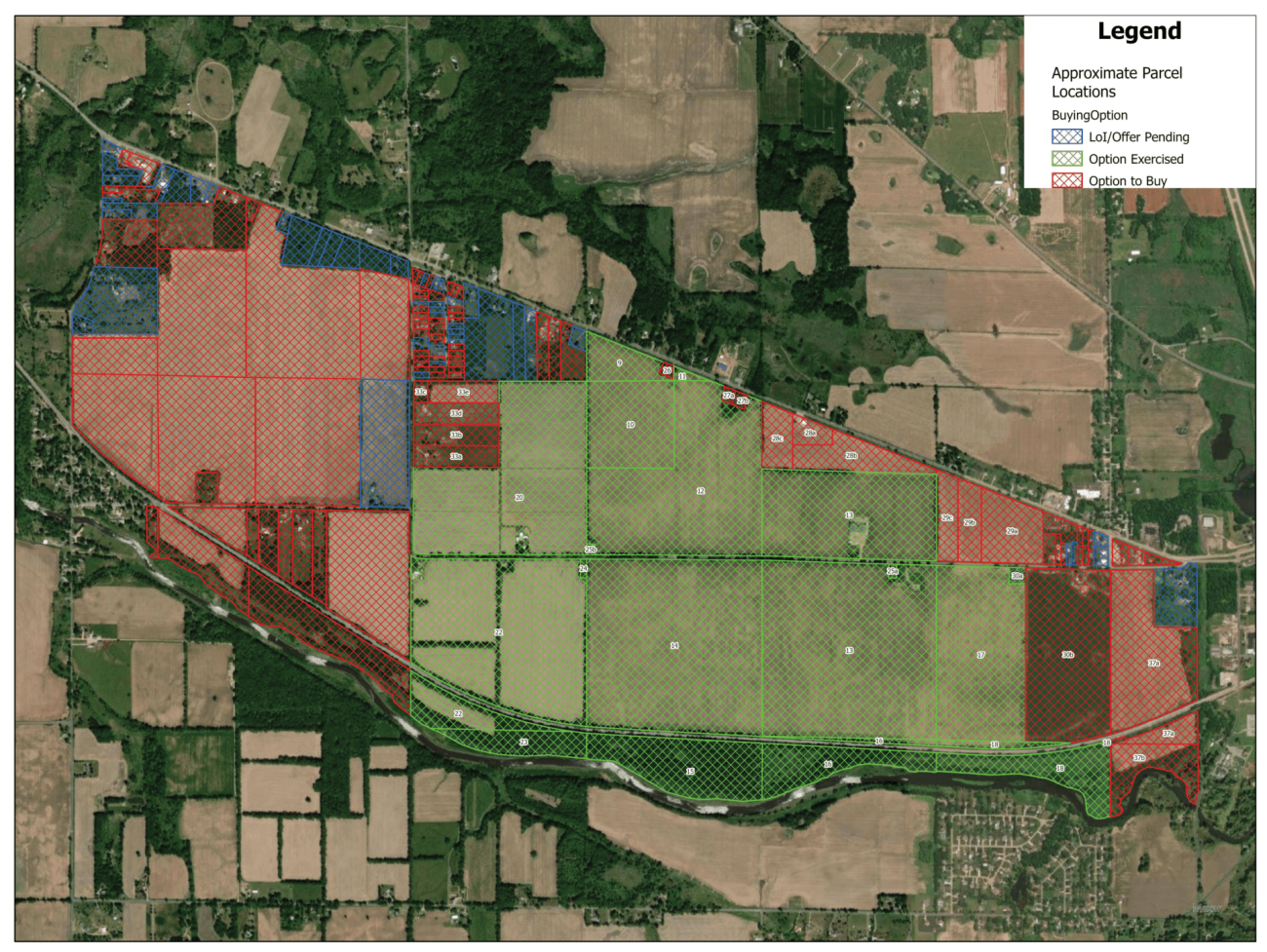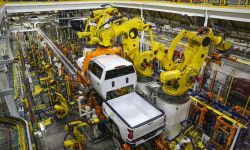Citizens group’s zoning lawsuit may stall Ford’s Marshall EV battery site

- Site preparation is taking place in Marshall, where Ford Motor Co. plans to build its $3.5 billion Blue Oval Battery Park.
- A citizens group opposing the project filed a lawsuit to force a public vote on the land’s rezoning for industrial use after Marshall officials did not certify petitions.
- A Calhoun County judge will rule the week of July 17 whether work on the property must cease while the court decides the case.
Work crews specializing in stormwater management, building demolition and environmental testing are preparing about 900 acres in Marshall for the eventual sale to Ford Motor Co. for the automaker’s planned $3.5 billion electric vehicle battery factory.
But a Calhoun County Circuit Court judge is expected to rule next week whether work on the property — purchased by a local economic development group with a loan and a grant from the state — should be paused during litigation over whether recently approved rezoning to allow that factory should go to a public vote.
The situation “really created a lot of unknowns,” Marshall City Manager Derek Perry said about the path forward for Ford’s Blue Oval Battery Park.
Related:
- Ford EV battery plant on Marshall Michigan megasite gets $1B in incentives
- Marshall megasite wins Ford EV battery plant project with Chinese partner
Among them are whether the city will be forced to allow a public vote on zoning of the property to allow industrial use, and — if so — what eventual uses will be allowed. More imminent, though, is whether the construction of the massive factory will be stalled.
Citizen backlash against the project that would turn a rural area west of the city of Marshall into an industrial hub led to a lawsuit filed June 27 by The Committee for Marshall - Not the Megasite after the city denied petitions seeking a referendum vote on the property.
The group is among several across the state pushing back against so-called megasite development totaling thousands of acres, aided by state economic development funding because of the potential to create thousands of new jobs. Questions in places like Big Rapids and Eagle Township in addition to Marshall are arising about transparency of the deals, the amounts of state incentives that would support them and whether the land use is too intense for rural communities.
However, the new lawsuit in Marshall and possible pause on the property work hinges on voting rights and not land use, said Robby Dube, lead lawyer for the citizen committee and an attorney for Minnesota-based Eckland Blando, which Dube said specializes in suing the government.
Ford announced the battery production factory in February, saying it will be the first lithium iron phosphate (LFP) battery factory in the U.S, allowing the automaker to sell two battery styles. The state awarded Ford just over $1 billion in incentives, expecting the facility to generate $29.7 billion in personal income over the next 20 years due to workers being paid from $20 to $50 per hour.
The land for Ford’s production was purchased this spring by the Marshall Area Economic Development Alliance (MAEDA), which assembled the group of parcels, many long used for farming, from among several owners.
A portion of the purchased property is 741 acres transferred from Marshall Township to the city, which voted in May to zone the property for industrial and manufacturing use, clearing the way for preparing the land for construction and Ford’s use.
The citizens group against the project collected signatures on a petition seeking a public vote on the rezoning, but the city denied it on June 19, saying the people collecting signatures were not on the committee seeking the vote. The city also says that the money it allocated toward the property while rezoning it — including $250,000 for inspection services — means the zoning is not eligible for a referendum vote.
Both of those arguments are being challenged by the plaintiffs.
“We believe the city improperly denied (the petition), and by doing so violated our client's constitutional rights and violated their own charter,” Dube told Bridge Michigan on Wednesday.
The city and MAEDA contest Dube’s arguments, with Perry, the city manager, saying that some of the work on the site, such as soil grading, can be done outside of industrial zoning, so some development is likely to continue no matter how the judge rules on the temporary restraining order.
He added that the ultimate outcome of the litigation will not be a vote on the project itself.
“A lot of people are interpreting (this as) a vote to say whether we liked the project or not,” Perry told Bridge. “And that's not actually what would be voted on. What would be voted on is the zoning classification.”
Dube calls the scenario a David versus Goliath case after five parties — including two Michigan economic development agencies and Ford — tried to intervene and join the city in the fight against the citizen's group.
“Not every state has a right to referendum,” Dube said. “But Michigan does. And that's important. Michigan citizens get to have a right to have a say, and what is happening is the government thinks its projects are more important than people's constitutional rights.”
Visiting Judge William Marietti rejected the bids from the automaker, the Michigan Economic Development Corporation and the Michigan Strategic Fund — the MEDC’s public funding arm — after arguments that they had a financial stake in the outcomes. However, he ruled that MAEDA, as the property owner, could intervene in the case alongside the city.
MAEDA CEO James Durian in a statement after the hearing said the project is significant for the community located east of Battle Creek due to the 2,500 projected jobs it will create, including many for people who do not hold college degrees.
The plaintiffs are a “small minority of individuals … trying to use the court process to circumvent the will of our elected officials in an effort to short circuit this transformational project,” Durian said.
Moreover, he said, “we are confident … this project will continue moving forward.”
MEDC and Ford declined to comment on the litigation.
The state’s investment in the site so far includes a $120.3 million Strategic Site Readiness Program grant for public infrastructure improvements and a $36 million loan from the Jobs for Michigan Investment Fund that allowed MAEDA to purchase the land. Eventually, the property will anchor a 1,900 acre megasite, Durian has said.
The ruling on the temporary restraining order that would pause activity on the battery site is expected next week, after Marietti on Wednesday said a decision will come in five business days.
A ruling on the referendum aspect of the litigation could take longer.
Timing is important for the project, MAEDA’s attorney Christopher Zdarsky said in court, with the group standing to have to pay Ford $10 million if it can’t stay on track.
Yet the voting rights aspect of the case means the cost shouldn’t be a factor in a decision, Dube said.
“The idea that there’s millions of dollars at stake so therefore we should just ignore the clear law laid out and people’s clear constitutional rights is just anathema to the United States and the American form of governance,” Dube said during the hearing.
Business Watch
Covering the intersection of business and policy, and informing Michigan employers and workers on the long road back from coronavirus.
- About Business Watch
- Subscribe
- Share tips and questions with Bridge Business Editor Paula Gardner
Thanks to our Business Watch sponsors.
Support Bridge's nonprofit civic journalism. Donate today.
See what new members are saying about why they donated to Bridge Michigan:
- “In order for this information to be accurate and unbiased it must be underwritten by its readers, not by special interests.” - Larry S.
- “Not many other media sources report on the topics Bridge does.” - Susan B.
- “Your journalism is outstanding and rare these days.” - Mark S.
If you want to ensure the future of nonpartisan, nonprofit Michigan journalism, please become a member today. You, too, will be asked why you donated and maybe we'll feature your quote next time!




